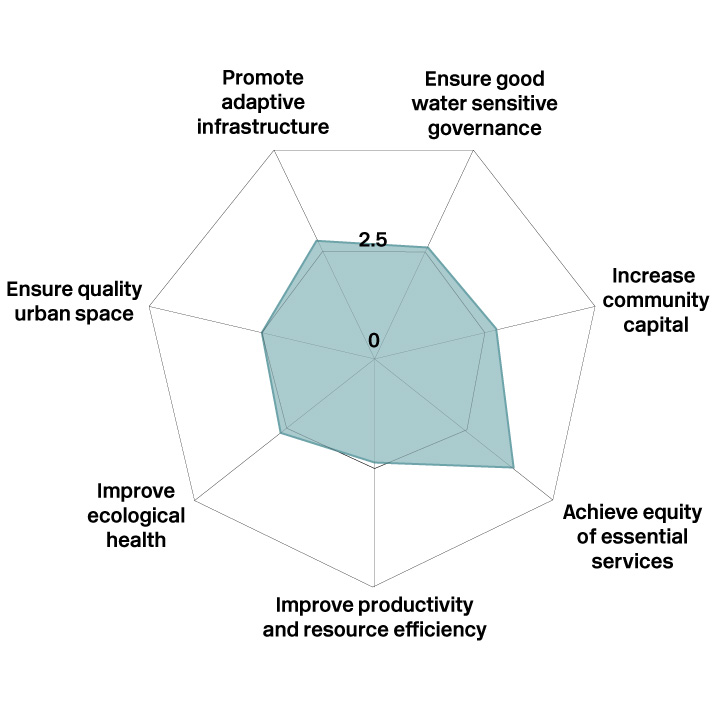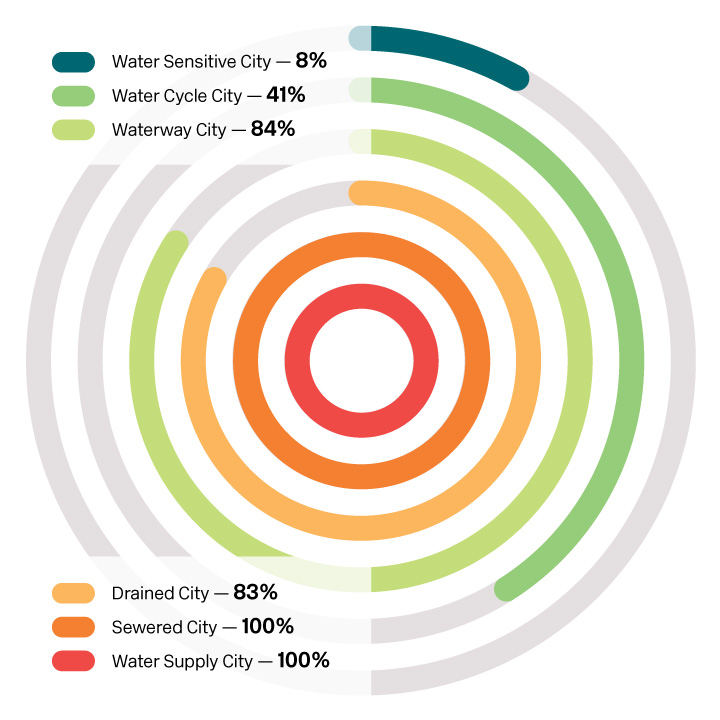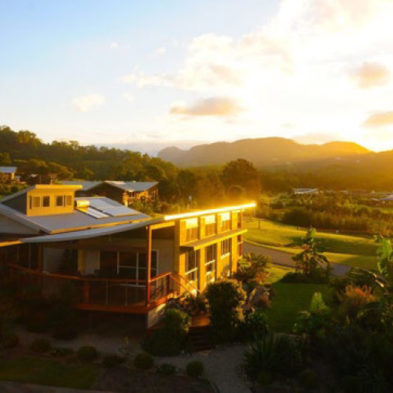Current Water Sensitive Performance
Performance against the goals of a water sensitive city
The City of Gold Coast was benchmarked using the Water Sensitive Cities Index in 2017, at a workshop attended by industry representatives.
The Gold Coast achieved its strongest result for the goal of Achieve equity of essential services (3.9/5.0). Areas for improvement included Improve productivity and resource efficiency (2.3/5.0) and Ensure quality urban space (2.5/5.0).


Achieving city–states
The Gold Coast’s results against the 6 city–states highlights its strong performance is in providing basic services. It has equitable water supply and sanitation services that are safe, secure and affordable (100% Water Supply City and Sewered City). The Gold Coast also performs well in providing environmental sustainability services (84% Waterway City) and protecting the community against floods (83% Drained City).
The most scope for improvement relates to using water to increase resilience (41% Water Cycle City) and liveability (8% Water Sensitive City).
The Water Cycle City rating could be increased by increasing the diversity of fit for purpose water sources and improving systems to inform transient populations about regional disaster response plans.
The Water Sensitive City rating could be improved by improving performance across all of the goals of the Water Sensitive City Index. The Gold Coast score is typical of modern, well-governed Australian cities.
Change strategy: how to become more water sensitive
- Vision and Transition Strategy for a Water Sensitive Gold Coast provides a framework for orienting and coordinating strategic action across the many different stakeholders who will need to collaborate to achieve the Gold Coast’s envisioned water future.
- City of Gold Coast Water Sensitive City Transition Strategy describes the drivers for developing the strategy, highlights the innovations and the lessons learnt.
- The Gold Coast Water Strategy 2019-2024 was developed in partnership with the CRC for Water Sensitive Cities. The strategy outlines key actions to progress towards a more liveable, resilient, sustainable and productive city. The Gold Coast’s journey towards a more water sensitive city will be measured every 5 years using the Water Sensitive Cities Index.
Research relevant to Gold Coast
- Risks to the long-term viability of residential non-potable water schemes: a review identifies the conditions leading to premature decommissioning of non-potable water schemes in residential developments and develops an improved understanding of the full range of risks to the long-term viability of schemes. The review considers numerous Australian case studies including rainwater harvesting and a recycled wastewater scheme on the Gold Coast.
- Water in the city: Green open spaces, land use planning and flood management – an Australian case study compares approaches taken to regional green open space planning in 3 Australian capital city-regions including South East Queensland. The study found limited explicit integration of flood management and green open spaces planning, and significant on-ground barriers to enabling this integration to occur
- Multi-stakeholder scenarios for decision-making in the face of climate change: the matter of scale found that the regional scale South East Queensland Climate Adaptation Research Initiative enabled the integration of stakeholder and sector perspectives related to complex challenges. Institutional and community scale projects were found to be better positioned for scoping more specific and tailored adaptation options.
- Sulfide and methane production in sewer sediments: Field survey and model evaluation studied sediment samples from 5 sewers including Burleigh Heads. Sulfate reduction and methane production from sewer sediments were found to depend on flow velocity and shear stress and able to be well described using a one-dimensional model.
Connecting land-use and water planning: Prospects for an urban water metabolism approach
Sulfide and methane production in sewer sediments: Field survey and model evaluation
Reducing sewer corrosion through integrated urban water management
Influence of pH on organic and inorganic colloids in stormwater
Multi-stakeholder scenarios for decision-making in the face of climate change: the matter of scale
Water sensitive cities and regions: tackling threats to water resources in metropolitan areas.
Managing urban water crises: adaptive policy responses to drought and flood in Southeast Queensland
Crisis, change and water institutions in Southeast Queensland: strategies for an integrated approach
Transitioning to water sensitive cities: insights from six Australian cities
Risks to the long-term viability of residential non-potable water schemes: a review
Queensland’s Planning Framework for Water Sensitive Urban Design
- Currumbin Ecovillage wastewater management and rainwaterwater harvesting case studies relate to a development in the Gold Coast hinterland. Each property has a 20–45 kL rainwater tank that supplies household potable water. All wastewater is treated at a sewerage treatment plant within the development and provided back to the houses in a purple pipe for non-potable uses. The drivers for the project included ensuring compliance with sustainability commitments and that the development site is not connected to the main water supply or sewer network.
Projects to mainstream water sensitive practice
Mainstreaming projects help water sensitive approaches become standard practice, supported by strong
community demand, robust science, technical capability, sufficient funding and supportive governance.

